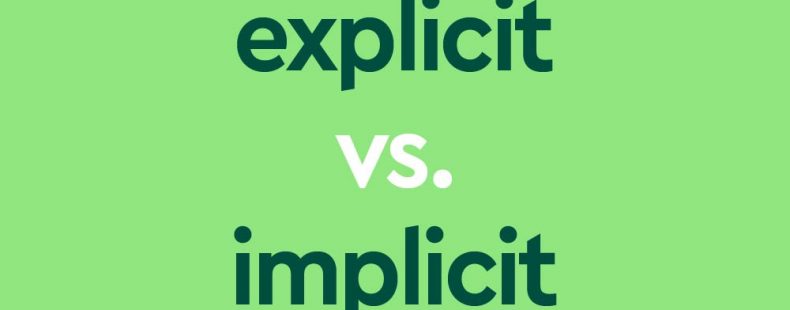The words explicit and implicit can be easily confused. They sound similar, have the same ending, and are both abstract. Adding on to that, both words have multiple meanings—sometimes they’re opposites, and sometimes they simply mean different things.
In this article, we’ll explain the different ways these two words are used, including which one means “implied” and which one means “expressed directly.” Don’t worry, we’ll be explicit in our explanation.
⚡ Quick summary
The main senses of explicit and implicit are opposites. Explicit describes something as being expressed directly without anything being implied. Implicit describes things in which a meaning is implied or hinted at rather than being expressed directly. Explicit and implicit also have other specific meanings that are not necessarily opposites.
What is the difference between explicit vs. implicit?
The adjective explicit describes something that has been expressed directly. For example, saying We gave them explicit instructions means that the instructions were stated in detail. Something that’s described as explicit doesn’t leave anything up to interpretation.
In contrast, the adjective implicit describes something that has been implied—meaning it has been suggested or hinted at but not actually directly stated or expressed. For example, saying We had an implicit agreement means that the agreement was implied but never actually stated or written down.
These senses of explicit and implicit are direct opposites. Consider the difference between these two statements:
- Don’t press that button—it will give you an electric shock.
- I wouldn’t press that button if I were you.
Statement 1 is an explicit warning. The speaker is clearly and directly telling you not to press the button and what will happen if you do. Statement 2 is an implicit warning. The speaker isn’t outright telling you not to press the button, nor do they say what exactly will happen if you. Rather, they are insinuating—implying, hinting—that something bad will happen if you press the button.
Directly related to explicit is the verb explicate, which means the same thing as explain. On the other hand, implicit is related to the verb imply, meaning “to suggest something without saying it.”
How to tell the difference between similes and metaphors.
To remember the difference, remember that the ex- in explicit comes from the prefix meaning “out,” and the im- in implicit comes from the prefix meaning “in.” If something’s explicit, a person comes right out and says it; if something’s implicit, the true meaning is in someone’s head.
The words explicit and implicit also have other senses that are used in particular contexts. For example, the word explicit can mean that something has sexual or inappropriate content, as in explicit lyrics or This interview features explicit language.
The word implicit can also mean “unquestioning or unreserved,” which is how it’s used in phrases like implicit trust and implicit obedience. Sometimes, it means “inherent.” This is how it’s used in the phrase implicit bias, which refers to a prejudice that someone has without knowing it.
It can be easy to confuse implicit and explicit because they are often used in the same contexts, or even alongside each other. Let’s look at a few specific situations to see the difference.
implicit vs. explicit memory
In psychology and the study of memory, the words implicit and explicit are used to describe two different kinds of memory. Explicit memory refers to information that takes effort to remember—the kind we need to think hard about to dig out of our memory bank. Implicit memory, on the other hand, refers to information we can recall very easily or even unconsciously.
For most people, things considered part of implicit memory include knowing how to tie your shoes, knowing how to read, or knowing where you live. Typically, you can remember these things without even having to think about them.
In contrast, examples of explicit memory include dates of historical events, times for scheduled appointments, and passwords. Most of the time, you need to actively think about these things (at least a little bit) in order to correctly recall them.
implicit vs. explicit costs
In finance and economics, implicit and explicit are used in the terms implicit costs and explicit costs.
Of the two, explicit costs are easier to understand. These are costs expressly documented as such by a company. Explicit costs include things like employee salaries, repairs, utility bills, debt payments, land purchases, and so on.
Implicit costs are less direct. These are the undocumented costs that a business experiences as the result of something happening. For example, a company might close a store for a day in order to clean it. While this closure may not cost the company money as it is recorded on a balance sheet, it does have an implicit cost: lost sales. As another example, a business may have a manager train a new employee. The company of course pays the explicit cost of the manager’s salary, but there is also the unrecorded implicit cost of time, productivity, and profit considered to be lost during the time taken away from the manager’s main job.














